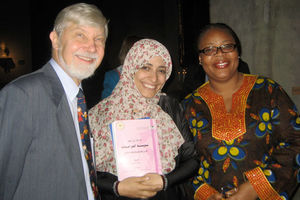
In the decade since Peter Wallensteen’s now-classic book Understanding Conflict Resolution was first published, the global landscape of war and peace has changed dramatically.
Just released (Sage Publications) in its third edition, the book has been updated to include analyses of conflicts in Afghanistan, Iraq, Somalia, Sudan, the Cote D'Ivoire, Iran, and Pakistan. It covers events such as the Arab Spring and the actions of the Obama administration, including the killing of Osama bin Laden, and features expanded analysis of peace agreements, gender and peace, and the effectiveness of the United Nations. These analyses are bolstered by new data based on recent research findings, said Wallensteen, the Richard G. Starmann Sr. Research Professor of Peace Studies at Notre Dame's Kroc Institute for International Peace Studies.
Originally published in 2002, "Understanding Conflict Resolution has become the gold standard in the field of peace studies and peace research," says Scott Appleby, director of the Kroc Institute.
"This new edition continues to showcase Professor Wallensteen's comprehensive mastery of the concepts and methods employed by the most effective practitioners around the world. His crisp analysis of post-Cold War efforts to reduce violence and end wars, sophisticated and historically informed commentary, and clear and inviting writing style will be welcomed by yet another generation of students and peacebuilders."
Wallensteen also is the Dag Hammarskjöld Professor in the Department of Peace and Conflict Research at Sweden’s Uppsala University, where he directs the Uppsala Conflict Data Program and the Special Program on the Implementation of Targeted Sanctions.
“Understanding Conflict Resolution is absolutely essential reading for anyone seeking insight into the origins, management, and transformation of conflict,” writes Kevin P. Clements, Foundation Chair of Peace and Conflict Studies and director of the New Zealand National Centre for Peace and Conflict Studies at the University of Otago in New Zealand. “This book is essential reading for scholars, practitioners and anyone interested in creative, progressive solutions to 21st century problems.”